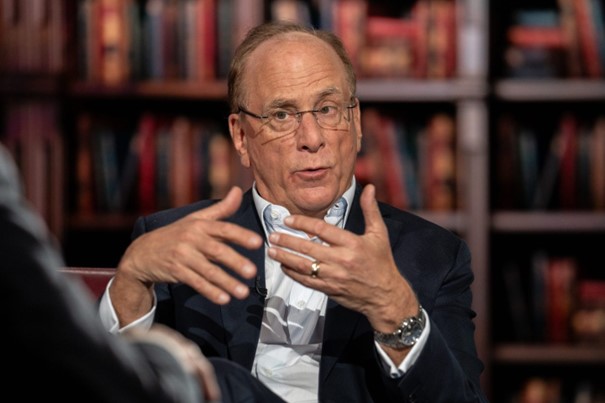
隨著美國(guó)國(guó)債逼近35萬(wàn)億美元大關(guān),貝萊德(BlackRock)首席執(zhí)行官拉里·芬克警告稱,,為了支付賬單,,美國(guó)必須保持經(jīng)濟(jì)增長(zhǎng),否則就有可能將難以承受的巨大負(fù)擔(dān)轉(zhuǎn)嫁給子孫后代,。
美國(guó)的公共債務(wù)問(wèn)題已逐漸提上國(guó)家議程:杰羅姆·鮑威爾(Jerome Powell)認(rèn)為“是時(shí)候”就這一問(wèn)題進(jìn)行成人對(duì)話了,,而摩根大通(JPMorgan)首席執(zhí)行官杰米·戴蒙(Jamie Dimon)則認(rèn)為債務(wù)是美國(guó)經(jīng)濟(jì)面臨的“最可預(yù)測(cè)”的危機(jī)。
美國(guó)銀行(Bank of America)首席執(zhí)行官布萊恩·莫伊尼漢(Brian Moynihan)和特斯拉(Tesla)首席執(zhí)行官埃隆·馬斯克(Elon Musk)等人也發(fā)表了自己的看法,,對(duì)美國(guó)聯(lián)邦政府支出以及如何償還債務(wù)表示擔(dān)憂,。
億萬(wàn)富翁芬克也加入了這一呼聲日益高漲的行列,他本周在“Squawk on the Street”上表示:“這不僅是我要傳達(dá)給美國(guó)的信息,,也是我如今要傳達(dá)給所有國(guó)家的信息:我們的赤字率正在上升。然而,,沒(méi)有人花足夠的時(shí)間來(lái)談?wù)摮嘧謫?wèn)題,。美國(guó)是世界上最大的赤字開支國(guó),而且其赤字率以世界上最快的速度增長(zhǎng),,因此,,我們需要想辦法將赤字對(duì)經(jīng)濟(jì)、利率和通貨膨脹的影響降到最低,?!?/p>
專家們主要關(guān)注的不僅僅是債務(wù)規(guī)模,而是美國(guó)債務(wù)占國(guó)內(nèi)生產(chǎn)總值的比重——事實(shí)上,,一定水平的債務(wù)是必要的,,也是受歡迎的。
這一因素向潛在的借貸機(jī)構(gòu)表明了美國(guó)債務(wù)占國(guó)內(nèi)生產(chǎn)總值的比重,,從而也表明了美國(guó)償還債務(wù)的能力,。分析人士擔(dān)心,,如果這一比重過(guò)大,美國(guó)國(guó)債的買家會(huì)棄之不顧,,這樣美國(guó)就只能求援,。
根據(jù)美國(guó)國(guó)會(huì)預(yù)算辦公室(CBO)的數(shù)據(jù),這方面幾乎沒(méi)有好消息,。美國(guó)國(guó)會(huì)預(yù)算辦公室在其最新更新中寫道:“根據(jù)美國(guó)國(guó)會(huì)預(yù)算辦公室目前的預(yù)測(cè),,2024年的赤字比該機(jī)構(gòu)2024年2月的預(yù)測(cè)高出4000億美元(或27%),2025-2034年期間的累計(jì)赤字比預(yù)期高出2.1萬(wàn)億美元(10%)”,。
據(jù)報(bào)道,,到2034年,公眾持有的債務(wù)將從今年占國(guó)內(nèi)生產(chǎn)總值的99%上升到122%,,超過(guò)二戰(zhàn)結(jié)束時(shí)1946年106%的歷史高點(diǎn),。
削減與增長(zhǎng)
關(guān)于如何使這一比率回歸正軌,通常有兩種觀點(diǎn),??礉q派希望經(jīng)濟(jì)增長(zhǎng)能夠抵消未來(lái)的債務(wù)和利息支出。
在爭(zhēng)論中,,持謹(jǐn)慎態(tài)度的一方,,雖然意識(shí)到近年來(lái)支出的性質(zhì),但希望看到政府采取更多的克制措施——或者至少制定今后將如何控制支出的計(jì)劃,。
億萬(wàn)富翁芬克堅(jiān)定地站在前者一邊,,力促經(jīng)濟(jì)增長(zhǎng),而不是削減開支,。
他告訴美國(guó)全國(guó)廣播公司財(cái)經(jīng)頻道(CNBC):“我們需要實(shí)現(xiàn)增長(zhǎng),,如果經(jīng)濟(jì)增長(zhǎng)無(wú)法使我們擺脫赤字困境,赤字將成為沉重負(fù)擔(dān),。我們的子孫后代無(wú)疑將承受這些我們負(fù)擔(dān)不起的巨額開支,。”
他補(bǔ)充說(shuō):"我們?nèi)缃裥枰綘I(yíng)業(yè)務(wù)不受任何約束,,以實(shí)現(xiàn)增長(zhǎng),。我們將利用私營(yíng)部門的發(fā)展實(shí)現(xiàn)增長(zhǎng)。我們不能再依賴公共赤字了——公共赤字占國(guó)內(nèi)生產(chǎn)總值的比重增長(zhǎng)得太快了,?!?/p>
“這是聞所未聞的。如今的赤字達(dá)到不可持續(xù)的水平,,但我們擁有世界上最具活力的資本主義體系,,實(shí)力雄厚的公司,無(wú)與倫比的創(chuàng)造力和偉大的技術(shù),。擺脫束縛,,讓它自由發(fā)展,,就能創(chuàng)造大量的就業(yè)機(jī)會(huì),并帶來(lái)發(fā)展機(jī)遇,,我們就會(huì)擁有不斷上漲的股票市場(chǎng),,這無(wú)疑將為這一發(fā)展機(jī)遇提供動(dòng)力?!保ㄘ?cái)富中文網(wǎng))
譯者:中慧言-王芳
隨著美國(guó)國(guó)債逼近35萬(wàn)億美元大關(guān),,貝萊德(BlackRock)首席執(zhí)行官拉里·芬克警告稱,為了支付賬單,,美國(guó)必須保持經(jīng)濟(jì)增長(zhǎng),,否則就有可能將難以承受的巨大負(fù)擔(dān)轉(zhuǎn)嫁給子孫后代。
美國(guó)的公共債務(wù)問(wèn)題已逐漸提上國(guó)家議程:杰羅姆·鮑威爾(Jerome Powell)認(rèn)為“是時(shí)候”就這一問(wèn)題進(jìn)行成人對(duì)話了,,而摩根大通(JPMorgan)首席執(zhí)行官杰米·戴蒙(Jamie Dimon)則認(rèn)為債務(wù)是美國(guó)經(jīng)濟(jì)面臨的“最可預(yù)測(cè)”的危機(jī),。
美國(guó)銀行(Bank of America)首席執(zhí)行官布萊恩·莫伊尼漢(Brian Moynihan)和特斯拉(Tesla)首席執(zhí)行官埃隆·馬斯克(Elon Musk)等人也發(fā)表了自己的看法,對(duì)美國(guó)聯(lián)邦政府支出以及如何償還債務(wù)表示擔(dān)憂,。
億萬(wàn)富翁芬克也加入了這一呼聲日益高漲的行列,,他本周在“Squawk on the Street”上表示:“這不僅是我要傳達(dá)給美國(guó)的信息,也是我如今要傳達(dá)給所有國(guó)家的信息:我們的赤字率正在上升,。然而,,沒(méi)有人花足夠的時(shí)間來(lái)談?wù)摮嘧謫?wèn)題。美國(guó)是世界上最大的赤字開支國(guó),,而且其赤字率以世界上最快的速度增長(zhǎng),,因此,我們需要想辦法將赤字對(duì)經(jīng)濟(jì),、利率和通貨膨脹的影響降到最低,。”
專家們主要關(guān)注的不僅僅是債務(wù)規(guī)模,,而是美國(guó)債務(wù)占國(guó)內(nèi)生產(chǎn)總值的比重——事實(shí)上,,一定水平的債務(wù)是必要的,也是受歡迎的,。
這一因素向潛在的借貸機(jī)構(gòu)表明了美國(guó)債務(wù)占國(guó)內(nèi)生產(chǎn)總值的比重,從而也表明了美國(guó)償還債務(wù)的能力,。分析人士擔(dān)心,,如果這一比重過(guò)大,美國(guó)國(guó)債的買家會(huì)棄之不顧,,這樣美國(guó)就只能求援,。
根據(jù)美國(guó)國(guó)會(huì)預(yù)算辦公室(CBO)的數(shù)據(jù),這方面幾乎沒(méi)有好消息,。美國(guó)國(guó)會(huì)預(yù)算辦公室在其最新更新中寫道:“根據(jù)美國(guó)國(guó)會(huì)預(yù)算辦公室目前的預(yù)測(cè),,2024年的赤字比該機(jī)構(gòu)2024年2月的預(yù)測(cè)高出4000億美元(或27%),,2025-2034年期間的累計(jì)赤字比預(yù)期高出2.1萬(wàn)億美元(10%)”。
據(jù)報(bào)道,,到2034年,,公眾持有的債務(wù)將從今年占國(guó)內(nèi)生產(chǎn)總值的99%上升到122%,超過(guò)二戰(zhàn)結(jié)束時(shí)1946年106%的歷史高點(diǎn),。
削減與增長(zhǎng)
關(guān)于如何使這一比率回歸正軌,,通常有兩種觀點(diǎn)??礉q派希望經(jīng)濟(jì)增長(zhǎng)能夠抵消未來(lái)的債務(wù)和利息支出,。
在爭(zhēng)論中,持謹(jǐn)慎態(tài)度的一方,,雖然意識(shí)到近年來(lái)支出的性質(zhì),,但希望看到政府采取更多的克制措施——或者至少制定今后將如何控制支出的計(jì)劃。
億萬(wàn)富翁芬克堅(jiān)定地站在前者一邊,,力促經(jīng)濟(jì)增長(zhǎng),,而不是削減開支。
他告訴美國(guó)全國(guó)廣播公司財(cái)經(jīng)頻道(CNBC):“我們需要實(shí)現(xiàn)增長(zhǎng),,如果經(jīng)濟(jì)增長(zhǎng)無(wú)法使我們擺脫赤字困境,,赤字將成為沉重負(fù)擔(dān)。我們的子孫后代無(wú)疑將承受這些我們負(fù)擔(dān)不起的巨額開支,?!?/p>
他補(bǔ)充說(shuō):"我們?nèi)缃裥枰綘I(yíng)業(yè)務(wù)不受任何約束,以實(shí)現(xiàn)增長(zhǎng),。我們將利用私營(yíng)部門的發(fā)展實(shí)現(xiàn)增長(zhǎng),。我們不能再依賴公共赤字了——公共赤字占國(guó)內(nèi)生產(chǎn)總值的比重增長(zhǎng)得太快了?!?/p>
“這是聞所未聞的,。如今的赤字達(dá)到不可持續(xù)的水平,但我們擁有世界上最具活力的資本主義體系,,實(shí)力雄厚的公司,,無(wú)與倫比的創(chuàng)造力和偉大的技術(shù)。擺脫束縛,,讓它自由發(fā)展,,就能創(chuàng)造大量的就業(yè)機(jī)會(huì),并帶來(lái)發(fā)展機(jī)遇,,我們就會(huì)擁有不斷上漲的股票市場(chǎng),,這無(wú)疑將為這一發(fā)展機(jī)遇提供動(dòng)力?!保ㄘ?cái)富中文網(wǎng))
譯者:中慧言-王芳
JEENAH MOON—BLOOMBERG/GETTY IMAGES
As America’s national debt nears the $35 trillion mark, BlackRock CEO Larry Fink has warned the country’s growth must keep up in order to pay its bills—or risk passing on a huge, unaffordable burden to coming generations.
The United States’ public debt is an issue that has been steadily climbing the national agenda: Jerome Powell believes it’s “past time” to have an adult conversation about the issue, while JPMorgan CEO Jamie Dimon believes debt is the “most predictable” crisis facing the American economy.
The likes of Bank of America CEO Brian Moynihan and Tesla CEO Elon Musk have also weighed in, voicing concerns about how much Uncle Sam is spending and how the nation will afford to service its debt.
Billionaire Fink has added his name to the growing chorus, telling?Squawk on the Street this week: “This is my message not just to the U.S. but to every country right now: We have rising deficits. No one is spending enough time talking about deficits. The U.S. deficits are the largest in the world—growing at the fastest rate in the world—and we need to be finding ways to minimize the role of the deficit on the economy, on interest rates, on inflation.”
The main concern of experts isn’t simply the volume of debt—indeed, a certain level of debt is necessary and welcomed—but America’s debt-to-GDP ratio.
This factor indicates to potential lenders how much the country owes versus what it produces and thus, how able it is to pay it back. If the ratio tips too high, analysts fear buyers of U.S. debt will turn their backs, leaving the nation cap in hand.
According to the Congressional Budget Office (CBO) there’s little good news on that front. In its latest update the CBO wrote, “In CBO’s current projections, the deficit for 2024 is $400 billion (or 27%) larger than it was in the agency’s February 2024 projections, and the cumulative deficit over the 2025–2034 period is larger by $2.1 trillion (10%).”
It reported debt held by the public will rise from 99% of GDP this year to 122% by 2034—surpassing its previous high of 106% in 1946, at the end of the Second World War.
Cuts vs. growth
There are generally two schools of thought on how to bring this ratio back into line. Those on the bullish end are hopeful that an uptick in economic growth will offset the debt and interest payments in future.
On the more cautious side of the argument are those who, while conscious of the nature of spending in recent years, want to see administrations exercise more restraint—or at least set out a plan for how they will curb outlays in the future.
Billionaire Fink is firmly on the side of the former, pushing for growth as opposed to curbing spending.
He told CNBC, “We need to grow, and if we can’t grow out of it these deficits are going to become a big burden. We’re going to really be putting on the backs of our children and our grandchildren a real burden of these massive, massive spends that we can’t afford.
“We need unfettered businesses right now,” he added. “We need growth. And we’re going to get growth from the private sector. We can’t rely on public deficits anymore—the public deficits are just growing too fast as a percentage of GDP.
“This is unheard-of. It’s at an unsustainable level, yet we have the most dynamic, capitalistic system in the world. We have great companies, we have great ingenuity, great technology. Let it unbound, let it go, create great jobs, create opportunity, and we’ll have a rising equity market that will really fuel this opportunity.”






